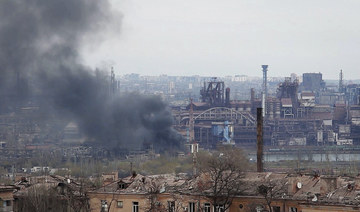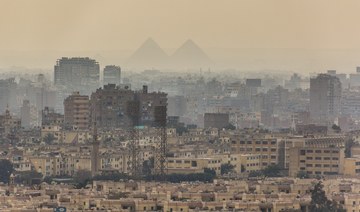RAMALLAH: There are signs that a diplomatic crisis between Israel and Russia, caused by a comment by Russian Foreign Minister Sergey Lavrov, could escalate.
Israeli leaders were furious when, during an interview with an Italian TV channel on Sunday, he suggested that Hitler was of Jewish origin.
Asked how Russia can claim to be fighting to “de-Nazify” Ukraine when President Volodymyr Zelensky is Jewish, Lavrov said: “I could be wrong but Hitler also had Jewish blood. (The fact that Zelensky is Jewish) means absolutely nothing. Wise Jewish people say that the most ardent antisemites are usually Jews.”
Six million Jews were murdered by Hitler’s Nazi Germany in the Holocaust during the Second World War. Lavrov’s comment sparked a storm of anger in Israel and the country’s Foreign Ministry summoned the Russian ambassador on Tuesday, demanding a clarification and an apology.
Israeli Foreign Minister Yair Lapid described Lavrov’s words as “unforgivable and disgraceful,” and “a grave historical mistake.”
Israeli Prime Minister Naftali Bennett said: “Such lies are meant to blame the Jews themselves for the most terrible crimes in history and thus free the oppressors of the Jews from their responsibility … No war we are witnessing in this era is comparable to the Holocaust and there is no war similar to it.”
Maria Zakharova, a spokesperson for the Russian Foreign Ministry, hit back, saying: “We have paid attention to the anti-historical statements of Israeli Foreign Minister Yair Lapid, which largely explain the current Israeli government’s approach in support of the neo-Nazi regime in Kyiv.”
Israeli political analyst Yoni Ben-Menahem told Arabs News that Bennett and Lapid are trying to put pressure on Russia to strengthen the position of US President Joe Biden against Iran, and to pave the way for the reopening of the US Consulate in East Jerusalem. Biden is planning to visit Israel and Palestine in June. However, he added that Israeli authorities face a balancing act as they do not want to strain ties with Russia so much that it threatens their operations against Iranian elements in Syria.
“Bennett and Lapid are trying to escalate against Russia to win Biden and assure him that Israel supports the US position regarding Ukraine,” Ben-Menahem said. “But at the same time, Israel does not want to reach a rupture with Russia so as not to impede the actions of the Israeli air force against Iranian targets in Syria.”
Israeli sources told Arab News that Lapid hates the Russians and is trying to show himself to be a supporter of democracy and human rights in Russia. In doing so, they added, he is trying to get closer to Biden and influence his policies.
Although tensions are rising in Russian-Israeli relations, the dispute has not reached the point of a diplomatic crisis just yet. However, with Israeli officials insisting on an official apology for Lavrov’s comment it is hard to predict how and when the tensions will ease.
Relations between Russia and Israel are currently largely based on shared interests in Syria. Moscow supports President Bashar Assad and wants to stabilize his regime and help to restore the country because this gives it the legitimacy to maintain Russian military bases there.
Israel has respected these objectives and has not targeted the Syrian regime. However, the option to attack Assad’s palace was considered by the head of the Israeli army more than two years ago because the Syrian president had allowed Iranians to enter the country and conduct military activities there. As a result the Iranians were considered legitimate targets for Israeli air attacks, in coordination with the Russians, who did not object.
Israeli experts told Arab News that if the relationship between Russia and Israel grows even more complicated the Israelis might bomb Syrian targets, which could weaken Assad and leave Moscow in the embarrassing position of being unable to protect an ally.
Ksenia Svetlova, a former member of the Knesset and a research fellow at the Institute for Policy and strategy at Reichman University, told Arab News: “Russia should mind its business. It has enough on its head and there is no need to open another front with Israel, which has no intention to anger anybody.
“However, it has to stand, as a Jewish state, for the victims of the Holocaust and it’s impossible to just move on, ignoring such horrific statements. Therefore, things will not get back to normal unless there is a formal apology from Russia.”




























